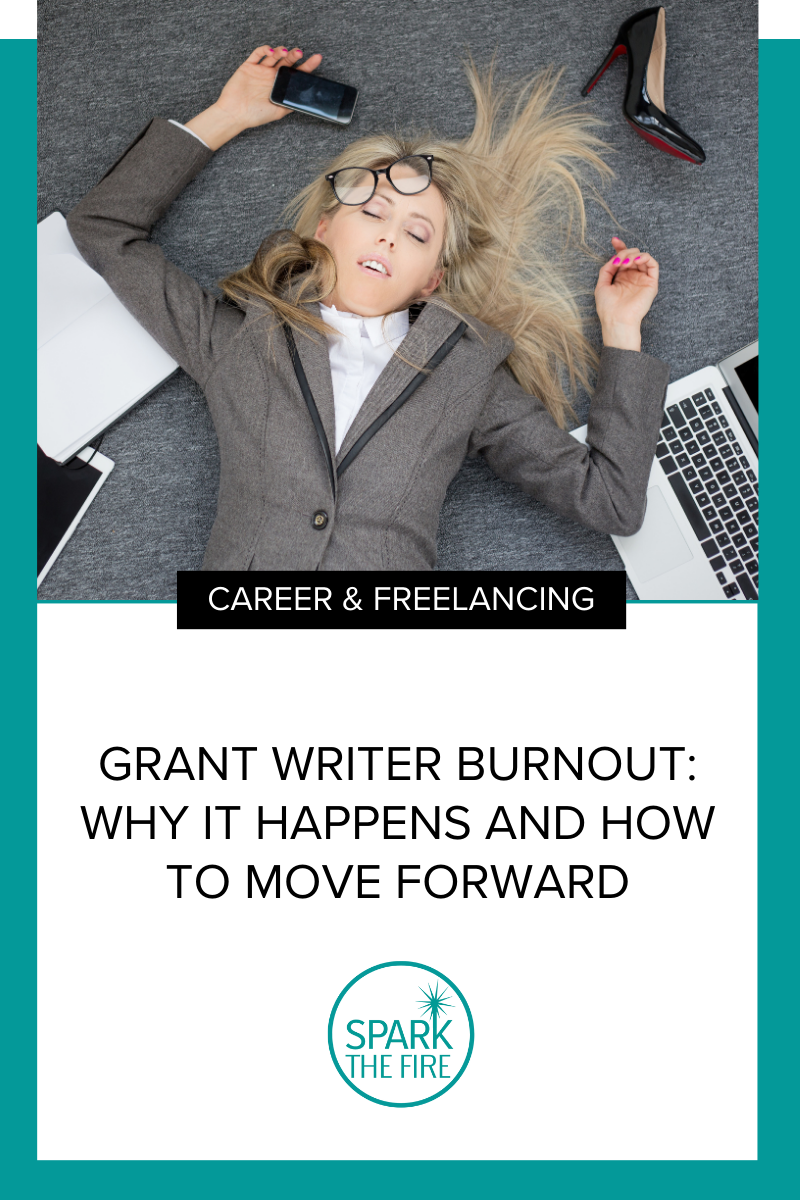Grant writer burnout is one of the most pressing issues in the nonprofit sector today. Many professionals enter the field with excitement—after all, grant writing careers promise meaningful work, writing for impact, and the ability to secure critical funding. But the reality is that too many grant writers are exhausted, underpaid, and questioning whether they can continue.
If you’ve been Googling “why grant writers quit” or asking ChatGPT how to survive in this field, you’re not alone.
Why Burnout is So Common in Nonprofit Grant Writing
Scarcity mindset. Many nonprofits operate with a constant sense of not having enough. Even with budgets, staff, and priorities clearly defined, grant professionals are asked to “do more with less.” Story: Maria, a mid-career nonprofit grant writer, secures one award only to be told to find more. The cycle never ends, leaving her drained and discouraged.
Low pay and undervaluation. Compensation often doesn’t match the expertise needed for successful grant writing jobs. In rural areas, pay is even lower and funding opportunities scarcer. Story: James transitioned from publishing into a grant writing career he loved—only to find himself burned out after years of low pay and no benefits.
Leadership gaps. Poor management or unrealistic goals often leave grant writers unsupported. Story: Danielle’s annual target was raised from $300K to $600K without staff help. Her grant writer job description changed constantly, and burnout soon followed.
Ever-changing demands. Federal NOFOs get pulled, foundations shift priorities, and requirements grow while resources shrink. Story: Malik worked nights and weekends on a large federal grant application—only to have the opportunity withdrawn. His exhaustion turned into despair.
Bigger questions. Many grant professionals are now asking: Why should essential programs depend on philanthropy at all? The existential weight of this question adds to grant writer burnout.
The Human Toll of Burnout in Grant Writing
Burnout doesn’t just affect job performance—it impacts health, relationships, and a sense of purpose. Many grant professionals describe:
Difficulty motivating themselves for one more proposal.
Grief when strong applications are rejected.
Stress symptoms tied to workload and uncertainty.
Feeling trapped after years in the grant writing field with limited career mobility.
If you recognize yourself in these stories, you are not alone.
Finding a Way Forward: Real Solutions for Grant Writers
Here are six concrete strategies to reduce grant writing stress and rebuild energy:
Set boundaries. If you’re a freelancer, your contract is your first line of defense—spell out scope, response times, and revision limits. Learn more in Spark the Fire’s Business of Freelance Grant Writing course. If you’re employed, enforce work hours (no more 10 p.m. emails) and align expectations with your supervisor.
Seek community. Isolation fuels burnout. Join Spark the Fire’s private grant writing community, Spark the Fire Grant Writer Collective, or professional groups like the Grant Professionals Association (GPA). Peer support transforms how you experience your work.
Advocate for change. Be part of reshaping the field. Follow Vu Le’s list of “crappy funding practices,” contribute reviews on GrantAdvisor.org, and raise your voice about funder behaviors that fuel nonprofit burnout.
Expand your skills. Adding new tools makes you more marketable. Try Spark the Fire’s Certificate in Grant Writing course, webinars,mini-courses, or blog resources for practical, on-demand professional development. If you’re Googling “how to become a grant writer,” this is where to start.
Rest when needed. Plan a “grant detox week” when possible. Build small daily rituals—walks, meditation, journaling—that remind you that you are more than your productivity.
Protect your financial well-being. Freelancers: switch to retainer-based or project-based pricing instead of hourly billing. Employees: explore the Spark the Fire Grant Writer Job Board, where listings are required to include pay rates, so you can see upfront if a position values your expertise.
Choosing Hope in the Grant Writing Profession
Despite the challenges, many grant professionals remain because they believe in the missions they serve. Some see grant writing careers as harm reduction—imperfect but essential. Others find renewed energy through grant writing support communities where colleagues encourage one another.
Story of renewal: Lauren nearly left the field after years of burnout. Instead, she found a supportive peer group, learned to set healthier boundaries, and reframed her role. Today, she feels energized again and proud of the work she contributes.
That’s why creating supportive spaces matters so much.
At Spark the Fire, we’ve built a grant writing community where professionals can share experiences, find encouragement, and access training. Whether you need strategies for managing workload, want to strengthen your grant writing skills, or just need a safe place to be heard, you don’t have to face burnout alone.
👉 Join Spark the Fire’s Community of Grant Writers and connect with others who understand both the challenges and joys of this work.
Together, we can do this work with more resilience, hope, and strength.
What strategies have you found helpful for managing burnout as a grant writer? Share your experiences in the comments—we’d love to learn from you.

